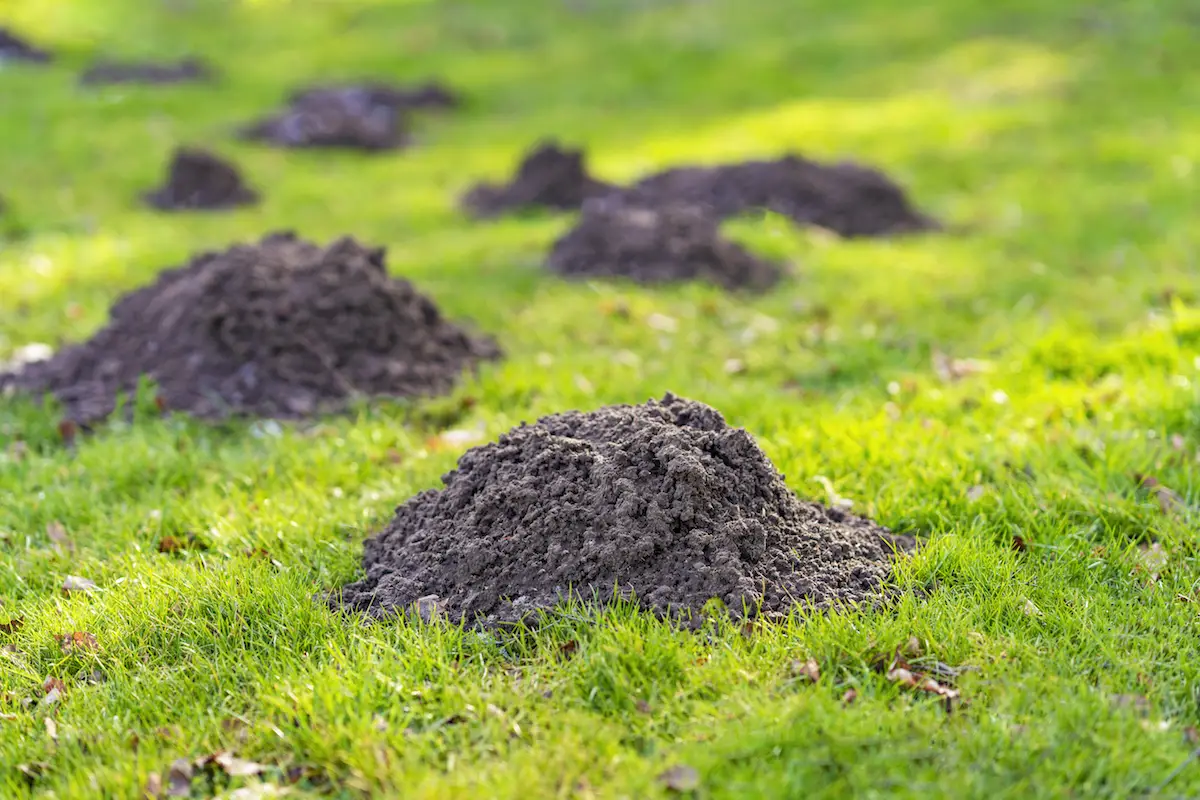As someone who loves nothing more than a well-manicured lawn, it can be troublesome when you notice any imperfections in your hard work. You may have noticed small holes appearing in your yard and be wondering where they came from. While they may seem insignificant, these holes could be indicative of a big problem. So, why are there small holes in my yard, and how to prevent them?
The reason why there are small holes in your yard can vary, as animals and pests such as moles, Japanese beetles, ground digger wasps, earthworms, rodents, and birds can be the reason why. While the answer to how to prevent these small holes in your yard depends on the source of the issue, typically it requires that you get rid of the pest or rodent by repelling or killing them.
So this is a basic idea of what we will be explaining in this blog post. As we will thoroughly examine and tell you in detail what can be causing these holes to pop up, and more importantly, how to prevent them in the future. So keep reading for our tips and tricks to keep your lawn looking beautiful so that you can have the home of your dreams!
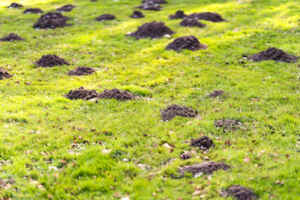
Why Are There Small Holes In My Yard and How to Prevent Them
Unfortunately, there are quite a few reasons you could be experiencing this issue. Some of the main suspects for digging holes in your yard are moles, rodents, insects, or birds. Your lawn may be targeted due to a soil issue. Many pests begin to invade lawns in which the soil is rich with organic matter, so it could be your soil that is bringing all the pests to your yard.
1. Moles
If the holes you are noticing are approximately 10 inches in diameter, you are most likely dealing with moles. Moles are small, burrowing mammals that live underground. They use their powerful front legs to dig underground looking for bugs and grubs to eat. You may have also noticed raised ridges of dirt, which indicate where they have tunneled. Moles can be especially difficult to get rid of and can attract even more rodents to your yard due to the tunnels they’ve made. Although moles will not be interested in eating your garden above ground, they will make a mess of your yard and chew through roots. The moles have been drawn to your yard due to the soil’s large population of bugs.
A preventative measure would be adding beneficial nematodes to your yard or spraying the entrances to the holes with castor oil. The bad taste of castor oil will likely make the moles find a tastier yard to burrow in. If you want the moles gone immediately, you might consider setting up traps. Most times, trapping moles is the only way to get them out of your yard. We recommend using humane traps set up along the holes to catch the moles. Then take them to a rural area away from anyone else’s home or garden.
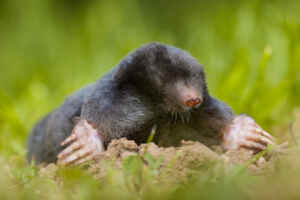
2. Japanese Beetles
The next culprits are most likely insects such as Japanese Beetles, wasps, or earthworms. Japanese Beetles can be identified by their iridescent green color. Regrettably, if you think you have a Japanese Beetle infestation, you are in for a tough time. Japanese Beetles only have a 40-day life span but they can do serious damage in that short time frame. Additionally, where there is one, there are many more.
As with moles, the beetles are attracted to your yard due to the soil as well as what you may be growing in your garden. They can also be attracted by dead trees in your yard, so if you have been procrastinating removing a dead tree, it may be time to get to work. Japanese Beetles can also destroy your lawn by eating the roots of lawn grass and whatever is in your garden.
There are a few ways to get rid of these pests, luckily. Entomologists agree that if you see one, go ahead and crush it. Insecticides should also be able to deter them, but if you are looking for a more natural remedy we suggest trying Neem oil. Neem oil will prevent the larvae from reaching adulthood, which should take care of an infestation.
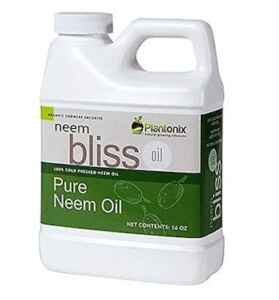
3. Ground Digger Wasps
In the summertime, the holes in your yard could be caused by Ground Digger Wasps. Also known as cicada killer wasps. Due to the increased amount of Cicadas in summer, Ground Digger Wasps may be drawn to homes with plenty of foliage to prey on the Cicadas. Just like their name implies, Ground Digger Wasps live in the holes that they burrow into the ground. This becomes damaging when large numbers of Ground Digger Wasps take up residency in your backyard, causing lots of quarter-sized holes in your lawn. Although they typically do not act aggressive to people, they can be quite intimidating as they are one of the largest kinds of wasps. Because of this, their sting is known to be more painful than a regular wasp’s sting.
Ground Digger Wasps do not have a long life span, most live for only a month. During this month, they are hunting cicadas to bring into their underground nests. There, the female wasps lay their larvae and die. Next summer, the larvae hatch and feed on the cicadas left in the nest and then the cycle begins all over again.
If you are struggling with Ground Digger Wasps on your lawn, the best way to get rid of them is to flag their holes during the daytime, and then at night pour ammonia into the holes. The ammonia will kill the adult wasps and prevents the larvae from hatching.
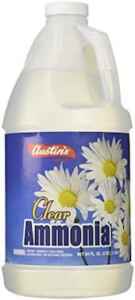
4. Earthworms
If you are a gardener, then you are no stranger to the Earthworm. The Earthworm might be the only helpful creature digging holes in your yard! Having Earthworms on your lawn is a sign of a healthy lawn. Earthworms can help aerate your lawn with their digging patterns. However, the lumps and holes left behind can be unsightly.
If you want to get rid of the Earthworms tunneling through your yard, you can use an electrical current device to force them to surface. Once they have surfaced, you can begin removing them into better spots or killing them.
5. Rodents
The next likely suspects digging holes in your yard are rodents such as voles, rats, and mice. Similar to moles, these rodents dig elaborate tunnels through your yard. A tell-tale sign of rodents in your yard is worn tracks in the grass, holes, and plants that no longer have their roots attached. Not only do they create a mess in your yard. However, they may also try to make their way inside your home. Rodents are known to reproduce quickly, so it is imperative to stay on top of the issue so it does not result in an infestation.
Additionally, once winter rolls around, the rodents will be protected in their tunnels in your backyard, so it is best to take care of them during spring or summer. We suggest using natural repellents like capsaicin, which can be found in chili peppers, or castor oil. Sprinkle them along your lawn for best results. If you chose not to use a natural repellant, we recommend contacting a pest control group. As previously mentioned, there is a chance these critters will want to make their way into your home, so it may be best to let a professional take care of them.
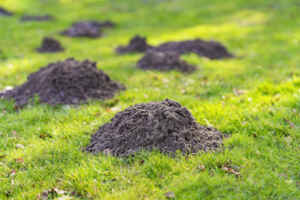
6. Birds
Lastly, there is a strong chance that birds are tearing up your yard looking for bugs. If your lawn is rich with organic matter, birds will flock to your lawn in droves. Everyone knows the saying “the early bird gets the worm”, but that’s not always the case. It won’t matter what time of day it is if your lawn is nutrient-rich because there will always be a worm, beetle, or bug for the birds. Unfortunately, there is no one sure-fire way to keep birds from digging up your lawn. However, we can recommend a few deterrents. Since the main attraction to birds are the grubs and insects living in your soil, try adding beneficial nematodes to your lawn. Nematodes will also rid your lawn of ants, fleas, and beetles.
A very simple solution is to install sprinklers in your yard. Turning on the sprinklers will startle away the birds, potentially saving your lawn from holes while also getting your plants watered. You can also try an electronic bird repellent that when triggered, emits LED lights and an ultrasound to ward off harmful critters.
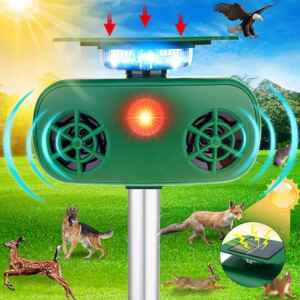
Conclusion
As we have discussed in this article, there are many different creatures that can be causing unsightly holes in your yard. The most common culprits are rodents, insects, and birds. Thankfully, there are many natural remedies such as capsaicin and castor oil that can take care of your problem, and newer electronic devices that can humanely ward off critters. If you find yourself in the midst of an infestation, do not hesitate to contact pest control to prevent an infestation inside your home as well. Did we answer your lawn questions? Let us know in the comments what was causing holes in your lawn!

